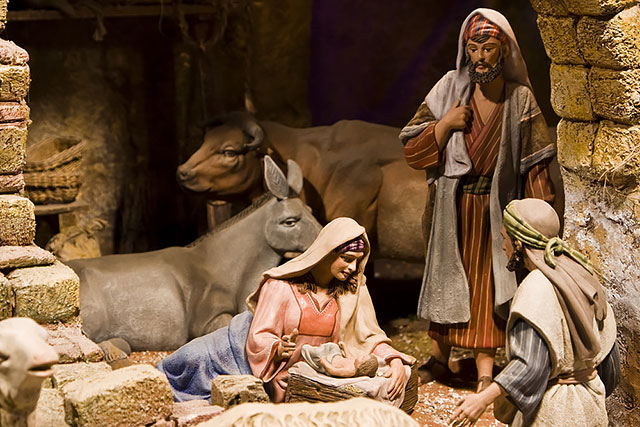
“When Joseph awoke, he did
as the angel commanded him.”
--Matthew 1:18-24
Who, over the age of 25, has not experienced that frightening moment when you wake up and suddenly realize: Oh my gosh! It’s almost Christmas! But, I’m not ready! And suddenly--if you are like me—you rush out to the garage in search of lights you promised to hang a month ago, and the wreath that still needs to be put on the door. By golly, those Advent candles aren’t going to light themselves!... And has anyone seen the inflatable pug?
It’s just not Christmas without the pug!
In a desperate frenzy of activity, we set about doing everything the season commands. Wanting our house, our tree, our table to be just right! Perfect, in fact. But there is always one more trip to HEB in search of gluten free ginger snaps for Aunt Lucy, or to Hallmark for a box of cards we still intend to write—Christmas is a season, you know; not just a single day!
And the presents! Aargh. What size sweater does my sister wear? Would your bother like a new tie? With Snoopy on it? What about Aunt Hildy? Does she still smoke a pipe? And I forgot to buy that tea your mother loves so much!
And just when it seems like it might come together, suddenly your niece announces she is vegan. Or someone else is added to the guest list and we need to borrow a card table from the neighbors, and get a few old folding chairs out of the garage… The chaos that comes with Christmas can be overwhelming. So much to do and if you put it all off long enough, so little time to do it.
Think about Joseph, he goes to bed one night certain of one thing: he is about to get divorced. But then an angel appears in his dream and everything changes.
Can’t you just see this humble old carpenter waking up and
realizing he isn’t ready? Rushing about trying to make his house perfect for a
new wife and this mysterious child of her’s—who just happens to be the savior
of the world… When suddenly there is another messenger. Another command. This time from Caesar; Everybody pack your
bags and head home for a census!
But I have plans for the holidays.
And again Joseph has to pivot, change plans, make new ones. A road trip. No problem.
But there isn’t any Trivago or AAA to help with reservations. But, surely God would provide a safe place for His son to be born, maybe even a room with a private bath and a view of the winter hillside. I hear the night sky is full of stars and the gathered sheep look almost like drifts of snow this time of year.
And like most of us (especially fathers), Joseph had to learn that no matter how well you plan or hard you try, something (or someone) unexpected shows up and the best laid plans come crashing down like shards from a shattered ornament. I am pretty sure if you asked him, Joseph would tell you a stable full of animals and strangers was never part of his plan. In fact, in his eyes, it probably seemed like a catastrophe, a sign somehow of his own failing as a husband and a step-father. And yet, in the fullness of God’s plan, it was anything but; it was the fulfillment of His Word, of His love.
“Thus says the Lord:
Heaven is My footstool, and the earth My throne;
What kind of dwelling can you build for me?
What is to be my resting place?...
This is the one I approve: the lowly and the afflicted,
the one who trembles at My word.” --Isaiah 66:1-2
God chose to enter into the world as an infant, vulnerable to the dangers and afflictions of the flesh and this world. That is the dwelling God chose, the dwelling He prefers. And no matter how we try to clean it up, sanitize it for Christmas cards, or Hallmark movies, God will always find a way to break through our plans, our desperate attempts to create a perfect Christmas, a perfect family, a perfect life… and through the vulnerability and chaos of our discomfort and failure and dysfunction, He will reveal Himself: a helpless baby lying in a manger, hungering for His mother’s tender breast, the warmth of His father’s gentle touch, offering us the chance to give Him not a gift card or a carefully wrapped present, but ourselves, our hearts, our love. That’s all…
And so here it is, Christmas is upon us, those final days before the celebration. We have just celebrated the 4th Sunday of Advent. We are at the eve of Christmas eve and yes company is coming, relatives, friends (folks you don’t know), and yes there are still cards to write and presents to buy and wrapping to be done. But, instead of entering into the frenzy of it all, slow down. Take a breath. And remember this: This Christmas don’t let the colored lights, and the glitter of the wrapping paper, the tinsel and the bows (and all your plans and expectations) blind you to the unexpected grace found only in the actual gift waiting for you right probably right where you least expect it.